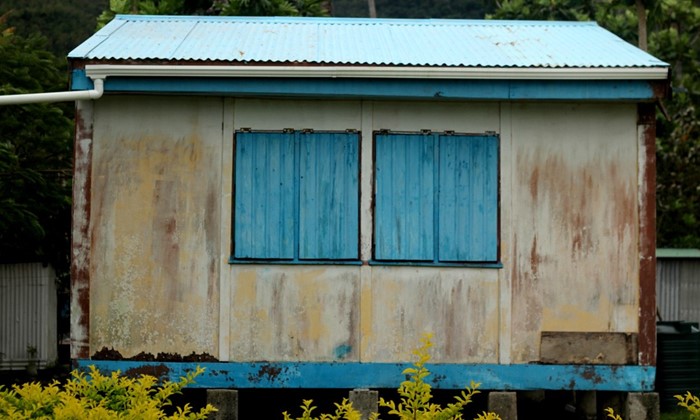Protecting Our Paradise Through Education, Outreach, and Aloha: My Final Excursion in Fiji
Protecting Paradise
As you may know, last month I had the opportunity to travel around Fiji on an environmental campaign called Protectors of Paradise, visiting remote outer islands, schools, and villages and speaking with students, companies, and organizations.
On one of our last excursions, we traveled to the Yasawa Islands, a mostly isolated area that makes up Fiji’s western border where land-based tourism was restricted until 1987. In 2002, Awesome Adventures Fiji started a daily roundtrip ferry service that makes numerous stops throughout the Yasawa Islands, allowing travelers and locals the opportunity to access these remote areas.
The Yasawa Islands are a mostly isolated area that makes up Fiji’s western border.
Despite the natural beauty of the Yasawa Islands, the 27 villages dotted throughout live below world standards of health and poverty. The people that call these islands home live far from the 'paradise' that first meets the eye. They struggle with severe shortages of clean drinking water, little to no health care, poor nutrition, a lack of educational support and supplies, inadequate power and no sustainable way of life for the future.
Local Yasawa villagers lack basic needs and amenities that others often take for granted.
Image courtesy of Vinaka Fiji
Wanting to assist these villages, the team at Awesome Adventures formed the Yasawa Trust Foundation which organizes volunteers to work directly with the Yasawa villages through their Vinaka Fiji volunteering experiences. Through fundraising and volunteering programs, Vinaka Fiji Volunteering aims to improve the provision of basic needs and amenities often taken for granted in modern society yet missing from village life in the Yasawas.
Vinaka Fiji
Upon our arrival in the Yasawas we met up with Vinaka Fiji. The Vinaka program supports villages with their access to fresh water, nutrition and electrical power, and also in areas such as education, marine conservation, and the environment. Vinaka means “thank you” and the name ‘Vinaka Fiji Volunteering’ was chosen to reflect the two-way nature of the relationship between those who operate and assist the Trust, and the people of the Yasawas whose work it benefits. Each by their actions is inherently saying “vinaka”.
Gaunavou School
Our Vinaka Fiji organizer arranged for our group of Protectors of Paradise to visit Gaunavou School and spend the morning with the kids talking about ocean pollution and keeping the reef healthy. The school is one of the larger schools in the area with around 130 kids.
Vinaka Fiji Volunteering offers ways to help the remote villages of the Yasawa Islands through classroom teaching. Image Courtesy of Vinaka Fiji.
In Fiji, all of the kids from a village attend the same school up until high school. If the student wishes to attend high school, he/she must attend one of the schools on the main island. This can be a costly endeavor, and many village kids do not receive a higher education.
Children at the Gaunavou School learning about ocean conservation.
As we walked the Gaunovou School grounds we were met with inquisitive looks, shy smiles, and bulas (bula means hello). We entered the classroom of the 5th, 6th, 7th, and 8th grade kids, about 40 students total. The Fijian students were very well behaved, but you could see their contained excitement as the 10 of us foreigners walked into their classroom. We started off by playing a quick “ice-breaker” game to loosen everyone up, and then I spoke about what I do back on Maui and the importance of a healthy ocean.
Most Fijian children who live in the villages grow up on and in the ocean. It plays an integral part in their lives: connecting them to other villages where no roads go, providing the main source of food and a way to cool off from the hot Fiji sun. Despite their close ties, Fijians do not inherently “take care” of the ocean: From stepping on the coral to throwing trash off the side of their longboats, a carelessness exists in regard to ocean protection.
The Ocean Connects Us All
As a traveler, marine biologist, and teacher I enjoy meeting and spending time with the locals; Visiting the Gaunavou School and interacting with the kids was a highlight of the trip for me. These conversations often lead into teachable moments where I have the opportunity to share knowledge. The goal of my visit is to make a friend and share our mutual love for the ocean together, not to shame or embarrass. We all face similar problems and must work together to keep the ocean healthy. As a Protector of Paradise, I lead with aloha in sharing my story about why I love the ocean and ways to keep the ocean healthy for all generations to enjoy. If only 1 Fijian student out of the 40 I spoke to starts to pick up trash, then I have made a difference.
Despite the beauty of the Yasawa Islands, local villagers live far from the “paradise” that first meets the eye.
Someone recently asked me, “Did you find paradise in Fiji?” I think paradise is a state of being and not a place. It looks different to every person. Traveling around Fiji afforded me the opportunity to surrounded myself with like-minded individuals working towards a sustainable future. I saw beautiful places and met some of the nicest strangers while sharing knowledge and helping educate others. This to me, is paradise. So yes, I did find paradise in Fiji. And I will be back again. Aloha!
Written by Magen Schifiliti ~ Conservation & Education Director at Trilogy




